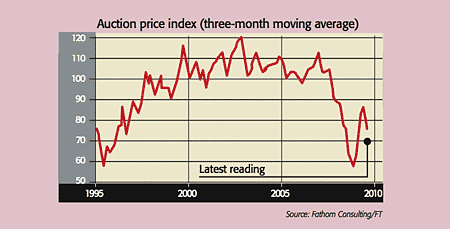Get the latest financial news, insights and expert analysis from our award-winning MoneyWeek team, to help you understand what really matters when it comes to your finances.
You are now subscribed
Your newsletter sign-up was successful
Want to add more newsletters?

Twice daily
MoneyWeek
Get the latest financial news, insights and expert analysis from our award-winning MoneyWeek team, to help you understand what really matters when it comes to your finances.

Four times a week
Look After My Bills
Sign up to our free money-saving newsletter, filled with the latest news and expert advice to help you find the best tips and deals for managing your bills. Start saving today!
David Rosenberg, chief economist at Toronto asset manager Gluskin Sheff and Associates, has been one of the few "voices of reason warning of the excesses" of the housing and credit boom and predicting the "unravelling" we are now seeing, says Edward Harrison on Creditwritedowns.com.
Now he says that the odds of a V-shaped recovery are "pretty close to zero". This isn't a normal post-war recession: the bursting of the credit bubble marked the end of 25 years of credit expansion, and having gorged on debt, the economy will take time to work it off. History shows that the impact of periods of credit contraction and asset-price deflation tends to "last for years not months".
The latest evidence shows that a sustainable recovery is miles away. The consumption outlook is grim. The economy has shed seven million jobs and counting; and with six people competing for every job, wages are plummeting. No wonder debt-soaked consumers, rattled by slumping house prices, are cutting borrowing. Consumer borrowing is 4.2% down year-on-year, the quickest consumer deleveraging since 1944. Banks, which are falling like ninepins as their losses pile up, aren't lending either: bank credit slid by an "epic" annualised 9% in the first four weeks of August.
MoneyWeek
Subscribe to MoneyWeek today and get your first six magazine issues absolutely FREE

Sign up to Money Morning
Don't miss the latest investment and personal finances news, market analysis, plus money-saving tips with our free twice-daily newsletter
Don't miss the latest investment and personal finances news, market analysis, plus money-saving tips with our free twice-daily newsletter
The upshot is that with "a gaping hole in the credit system... any sort of organic rebound in economic growth" is not going to happen. Governments are currently propping up economies worldwide. Rosenberg estimates that "all of the world economic rebound" this year is due to fiscal stimuli, while the same goes for 80% of next year's expected growth. The deflationary backdrop implies a "listless" recovery and years of "anaemic" growth in the pattern of "a series of small Ws".
Investors counting on a rapid rebound haven't yet worked this out. They are pricing in not just the end of recession, but "two years of recovery". The economy is usually growing by 4% by the time stocks have recovered by 50%. Once the market sees that this recovery is "as illusory and artificial" as its early 1930s counterpart, stocks will fall back. Further out, the broad trend in equities is likely to be flat or down: stocks are only half way through a secular (long-term) bear market, reckons Rosenberg, and history shows these last around 18 years.
The big picture: house prices have much further to fall
Houses sell much faster at auction than in the normal market and so auction prices should provide a clearer picture of current market conditions than the usual gauges; auction prices thus tend to be a leading indicator.

And the news from the auction market is hardly encouraging, as Chris Giles points out in the FT.
Last month the average property sold at auction fetched just 70% of the price that could be expected in the conventional market, according to Fathom Consulting, and the discount has widened from 10% three months ago. That points to renewed house-price falls in the months ahead.
Get the latest financial news, insights and expert analysis from our award-winning MoneyWeek team, to help you understand what really matters when it comes to your finances.
MoneyWeek is written by a team of experienced and award-winning journalists, plus expert columnists. As well as daily digital news and features, MoneyWeek also publishes a weekly magazine, covering investing and personal finance. From share tips, pensions, gold to practical investment tips - we provide a round-up to help you make money and keep it.
-
 Can mining stocks deliver golden gains?
Can mining stocks deliver golden gains?With gold and silver prices having outperformed the stock markets last year, mining stocks can be an effective, if volatile, means of gaining exposure
-
 8 ways the ‘sandwich generation’ can protect wealth
8 ways the ‘sandwich generation’ can protect wealthPeople squeezed between caring for ageing parents and adult children or younger grandchildren – known as the ‘sandwich generation’ – are at risk of neglecting their own financial planning. Here’s how to protect yourself and your loved ones’ wealth.

